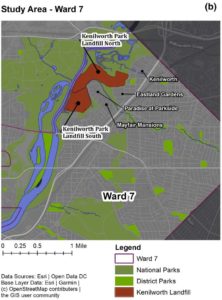Abolitionist political ecology and how it informs the climate justice movement is the subject of my collaborative research endeavor with my talented colleague Dr. Malini Ranganathan. We present a case study from Washington, DC.
The findings from the research were published in the journal Antipode: From Urban Resilience to Abolitionist Climate Justice in Washington, DC
You can download the full paper here.
Abstract:
What would abolitionism mean for climate justice? “Resilience” is proposed by experts as a solution to climate change vulnerability. But this prescription tends to focus on adaptation to future external threats, subtly validating embedded processes of racial capitalism that have historically dehumanised and endangered residents and their environments in the first place. This article focuses on majority Black areas said to be vulnerable to extreme weather events and targeted for expert-driven resilience enhancements in America’s capital city, Washington, DC. Drawing on key insights from Black radical, feminist, and antiracist humanist thought, we reimagine resilience through an abolitionist framework. Using archival analysis, oral histories, a neighbourhood-level survey, and interviews conducted between 2015 and 2018, we argue that abolitionist climate
justice entails a centering of DC’s historical environmental and housing-related racisms, the intersectional drivers of precarity and trauma experienced by residents beyond those narrowly associated with “climate”; and an ethics of care and healing practiced by those deemed most at risk to climate change.
justice entails a centering of DC’s historical environmental and housing-related racisms, the intersectional drivers of precarity and trauma experienced by residents beyond those narrowly associated with “climate”; and an ethics of care and healing practiced by those deemed most at risk to climate change.
Our work looks at climate change, vulnerability, and community resiliency strategies in Washington DC and was supported by the Metropolitan Policy Center.